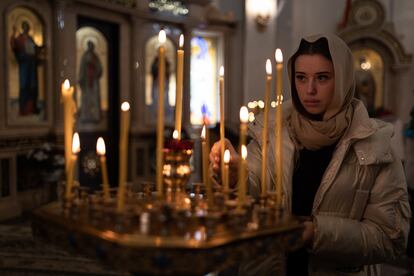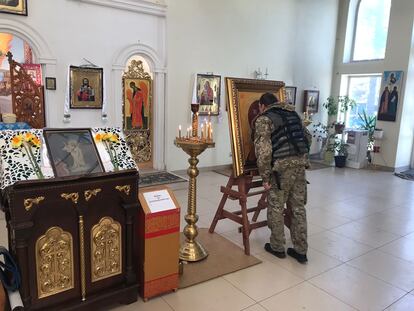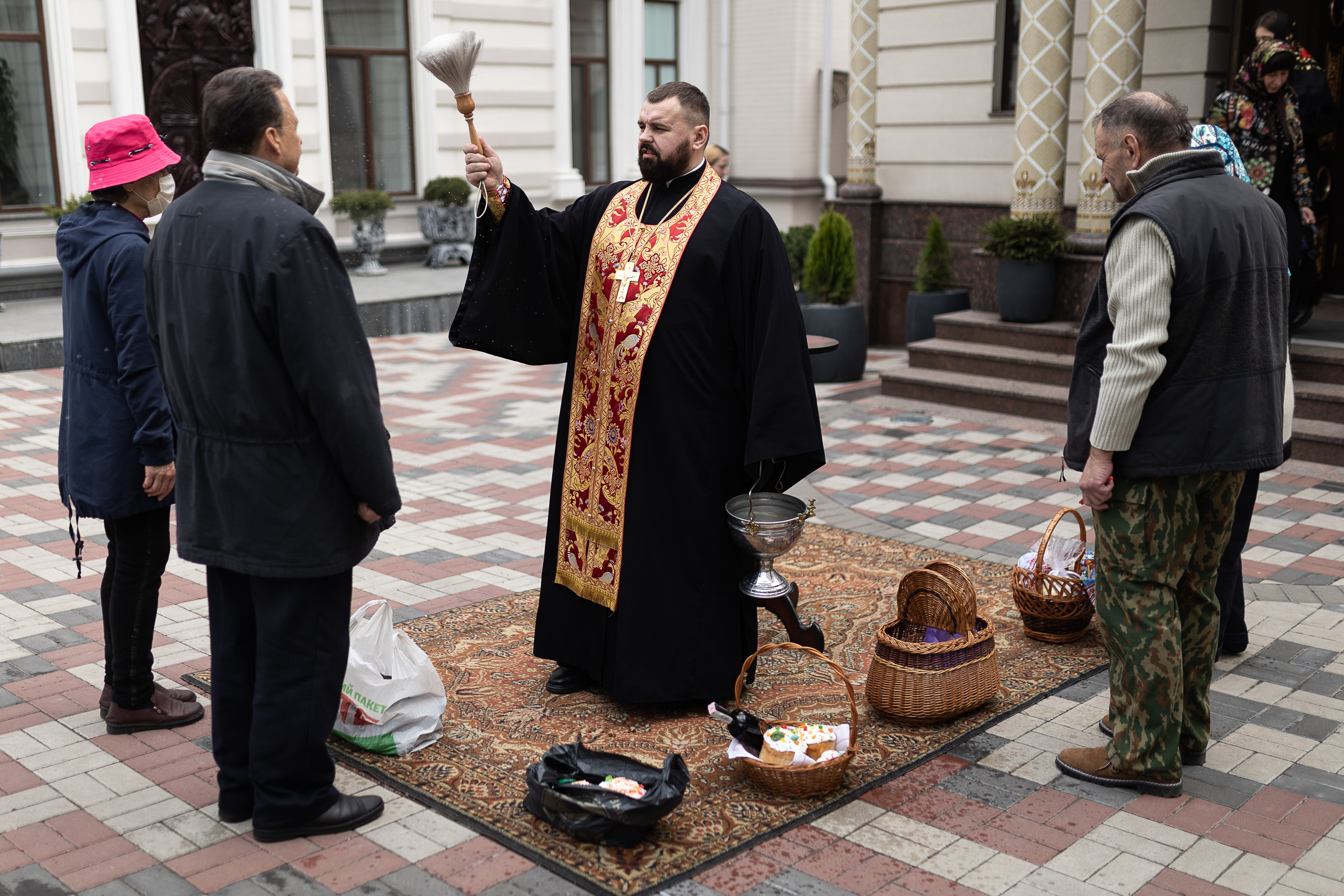Celebrating the saddest Easter in Ukraine
Towns like Bucha, Irpin and Gostomel, scenes of the worst massacres of the war, are observing the holiday with prayers and thanks to the army and to God for keeping them alive


Larisa Borisova, 63, got up this Sunday, collected the hard-boiled eggs that she had prepared and painted the day before, put them in a basket along with the candles, a cake and a bottle of liquor, tied a scarf around her head and walked to the Church of Our Lady of Pochaev in Bucha to observe Easter, the most important celebration in the Orthodox calendar after Christmas.
Before the war this was a city of about 35,000 inhabitants attached to the capital, Kyiv, but since early April it is much more than that. It is a name linked to one of the worst massacres since the war in the former Yugoslavia. During the four weeks that the Russian occupation of the municipality lasted, hundreds of people were killed; for days, bodies lay strewn in the streets without anyone daring to bury them for fear of being finished off. Since then, sadness has settled in its streets and women like Larisa are like water after a drought, the first smiles seen after two months of terror.
The way from her house to the church is like a walk through a hall of horrors: destroyed homes, shelled facades, charred vehicles, collapsed roofs, abandoned tanks and scattered rubble bear witness to a battle that ended in massacre, but where every square foot was defended as if the invasion of Ukraine depended on it. The cafeteria that used to offer cappuccinos and espressos for 20 hryvnias (about 63 cents of a euro) is today reduced to glass and rubble.
The church official greets the parishioners one by one like someone receiving a family member in the living room. In fact, this little church was home to them all for several days, when missiles were flying overhead as their neighborhood fell apart. The priest, dressed in a red cassock with gold embroidery, hugs them, asks about their health, enquires about their family, comforts them and encourages them “because today Christ is resurrected and today life is resurrecting,” he explains.
One of the most devout parishioners is Volodymyr Kutzenko, a 20-year-old who prays like never before. He mutters before an image of the Virgin Mary, extends the palms of his hands, looks up at the sky and mutters again. “We have had a very bad time, for days we endured shots and more shots from the ‘orcs,’ as we call the Russian soldiers. We saw neighbors die who fell there, there and there…,” he says, extending his arm to point out parts of the garden where, before the invasion, neighbors used to walk and children used to play. That life is returning to this place is evidenced by the dark humor Kutzenko distills when he is asked about his profession: “Electrician. The way everything is looking, I’m going to have more work than ever.”
The monk distributes water with a feather duster that looks like a barber’s brush. He wets the offering baskets and the heads of the parishioners enthusiastically until a couple of soldiers enter the temple and he then directs all his attention at them. “What do you need? Are you okay? Do you want to talk?” he asks. The first soldier is holding his helmet which is full of colored eggs and the second heads towards a painting of the Virgin Mary before which he remains for a long time, saying something under his breath. Before finishing, he kisses the image and makes the sign of the cross on his chest several times. “Thank God and our troops who protect us and help us so that today we are alive and can celebrate Easter. Thanks to those who are defending the country: today we can pray for those who are here and for those who are not,” says the priest.

Svitlana Kurchenko, 62, devotes herself to an image of the Virgin Mary before heading home. What is she praying for? “So that hate doesn’t stay inside me and I am able to move forward without a spirit of revenge or resentment towards those who have done us so much harm,” she says with the generosity of someone who firmly believes in the image in front of her. “For those of us who have suffered so much and have nothing, religion has been the only protection we had until quiet came,” says Kurchenko, one of the 1,800 people, out of a population of 35,000 in Bucha, who stayed during the Russian occupation. A few steps from here, next to the church of Saint Andrew where she used to pray, is the mass grave with 50 bodies of people who were executed, and which has become one of the main pieces of evidence used by international justice agencies to accuse the Putin regime of crimes against humanity. The place, which has been visited in recent weeks by authorities, forensic scientists and politicians from all over Europe in search of evidence, is a cold and silent wasteland in which only the the black plastic bags left over from the exhumation remain.
But peace and quiet is something relative in Ukraine. On Saturday, when the Easter celebrations began, seven missiles fell on the city of Odessa, in the south of the country, leaving eight dead and dozens injured. “Bastards, bastards and bastards,” said President Volodymir Zelenskiy this weekend as he commented on the news to journalists.
The Ukrainians celebrated the passion, death and resurrection of Christ this past Sunday, a week after the Roman Catholics, due to the adjustments made by Pope Gregory XIII in 1582 to correct the 10-day delay accumulated in the calendar of Julius Caesar from 46 BC. Although Pope Francis has proposed unifying both celebrations, the Orthodox Church has preferred to keep its traditional calendar. “It is a celebration that unites the family. Now we are at war and it is more important than ever to continue with our traditions, ” says Kurchenko, her headscarf wrapped firmly around her head. “So now I’m going to spend the rest of the holiday with my husband and children,” she says, bidding goodbye with a huge smile. The biggest smile of the saddest Easter.
Blessing under the bombs in Dnipro

In Dnipro, where a bombing raid on the train tracks killed a man this past Saturday, dozens of people gathered in Orthodox churches to receive the priest's blessing and attend Easter services. The city, in the center-east of the country, is an important communications hub for supplies for the Ukrainian troops, and it has become a transit point for thousands of displaced people from the eastern and southern fronts.
One of them is Larissa from the Donetsk region, which has been badly ravaged in this second phase of the war. Larissa fled with her young daughter last week, and on Sunday she prayed in front of a small church of the Ukrainian Patriarchate in the center of Dnipro. It is one of three churches built recently, following the split from the Moscow Patriarchate, which the Ukrainian government considers to be the religious arm of the Kremlin. “I dont know where to go. I would like to go back to my house, but my neighbors say that the situation there is bad. It's horrible”, she laments.
Tu suscripción se está usando en otro dispositivo
¿Quieres añadir otro usuario a tu suscripción?
Si continúas leyendo en este dispositivo, no se podrá leer en el otro.
FlechaTu suscripción se está usando en otro dispositivo y solo puedes acceder a EL PAÍS desde un dispositivo a la vez.
Si quieres compartir tu cuenta, cambia tu suscripción a la modalidad Premium, así podrás añadir otro usuario. Cada uno accederá con su propia cuenta de email, lo que os permitirá personalizar vuestra experiencia en EL PAÍS.
¿Tienes una suscripción de empresa? Accede aquí para contratar más cuentas.
En el caso de no saber quién está usando tu cuenta, te recomendamos cambiar tu contraseña aquí.
Si decides continuar compartiendo tu cuenta, este mensaje se mostrará en tu dispositivo y en el de la otra persona que está usando tu cuenta de forma indefinida, afectando a tu experiencia de lectura. Puedes consultar aquí los términos y condiciones de la suscripción digital.








































